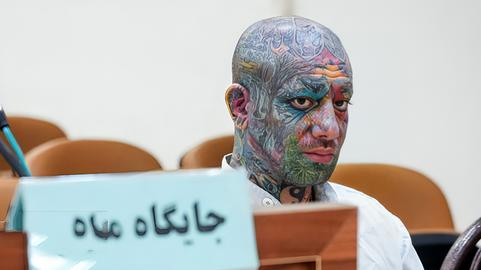He strolls slowly across the pedestrian bridge listening to music, so the sounds of everyday life on the street are inaudible. He is in a world of his own. So he is shocked when all of a sudden someone grabs his shirt from behind. Turning around, a knife is pointed directly at his neck. He begins to shout and swear. Passers-by assume they are witnessing nothing more than a regular fight, something they have no interest in involving themselves in.
But amongst the shouting and agitation, somebody distinctly says, “Give me your mobile phone.” Then he grabs the phone and punches him in the face, adding, “Now go before I hit you again.” But, he follows his attacker several steps nonetheless. Several feet ahead, a motorbike waits for the thief, which he jumps on and uses to make a quick escape. This incident, one of many, happened at nine in the evening on one of the busiest roads in western Tehran.
Another person felt the blade of a knife shoved against the back of his neck. He was forced to hand over his bag, laptop, sunglasses and wireless modem to the person threatening him. While another person was put at knifepoint by several assailants just minutes after getting into a taxi at Molasadra Avenue. The people in question took their victim for all that he had and dropped him at a remote place in Amirabad.
Over the past couple of days, countless similar incidents have featured on kheftgiri.com, a website that was launched by mugging victim Pouya Kondori. Just last week, a friend of Pouya’s tweeted that Pouya had himself had all his personal belongings taken when he was mugged, which is why he and his friends had decided to launch the website.
The website’s introductory section says, “We’ve been mugged and threatened with knives and daggers on the streets of Tehran several times. That’s why we decided to launch the Kheftgiri [mugging] website and to ask all those who’ve been mugged to report their stories online giving details of time and place. That way we can pinpoint the most dangerous parts of the city and tell people where they are. We hope to improve security to the point that we can eventually shut down the website.”
For victims wanting to report their cases, they should go to the New incidents section of the site where they will be asked several questions, including things like which weapon was used during the attack, where it happened and so on. There are three subcategories; muggings where a knife or dagger is used, muggings without a weapon and handbag theft. The page also asks for a brief description of what happened and recommends to “not lie and be sincere... please be honest... and describe what really happened.”
But the registering of mugging incidents is not the website’s only purpose; it also offers information on similar crimes happening in other countries. According to the site, Iran ranks 23rd in the world for the number of mugging incidents.
Then on November 25, the site’s administrators added another section, which is solely dedicated to muggers. “If by any chance you’re a mugger, please click here,” the site says. “This isn’t a joke. We really think that if a person sees this page and they’re impressed by it, we’ve succeeded in having an impact on the mugging problem. People involved in mugging are drug addicts, have family problems, are unemployed and they’re all illiterate. Therefore, we pray for you and have some good advice for you.”
These suggestions are divided into four categories. For those who are unemployed, there is a list of recruitment centres. Likewise, there is a list of rehabilitation centres for drug addicts, education centres for the unemployed and social aid centres for those suffering from “family problems.”
For the past couple of days, the website has been a hop topic on social media, with some people criticising it and other people commending its efforts or offering suggestions on how to improve it.
“We tell our story and add to the statistics whilst also fighting against mugging,” says one user. “Which is exactly how corruption is dealt with in other countries. Just look at the I Paid A Bribe website.”
Ipaidabribe is now a global project to fight government corruption and to enhance public responsibility but it began in India where paying bribes are a part of daily life. On the website, people write about their experiences of paying a bribe. The site has become such a success that it is now used as a source to analyse bribery in India.
IPaidABribe has since gone to many other countries, including Greece, where it in turn spawned another sister campaign website called “I gave an envelop.” This works by people writing about the amount of bribes they have had to pay in a small notebook. This produces great results and demonstrates which sectors are being most affected by bribery.
Since Kheftgiri started, many of its users are hoping it will become Iran’s version of “I Paid A Bribe.” They want it to become a statistical source on muggings and snatch theft, which is currently so prevalent in Tehran. And if, as Pouya Kondori wrote on his twitter account, that 100 cases were registered in the first two days alone of the website’s life is true, there is good reason to believe that it will.






















comments